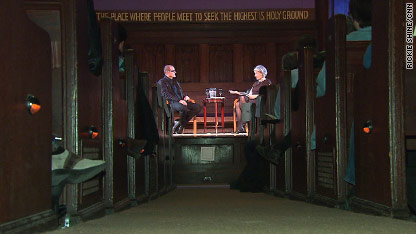Commentary on Challies' Review of Rob Bell's "Love Wins"
As promised, here is a response to Tim Challies' book review of Rob Bell's new controversial book; "Love Wins: A Book About Heaven, Hell and the Fate of Every Person Who Ever Lived".
Most of you know by now, if you are reading this post, Bell's book has been the center of attention since February 26th, when Justin Taylor published a blog post (based on Bell's promotional material) announcing Bell as a universalist. As a result of this post, the controversy about Bell has been discussed/debated/argued extensively via blogs and Twitter. Some do so in the name of perserving orthodoxy while some do so in the hope of perserving Bell's name. Still yet, there are others that do so in a desperate attempt to unravel Bell's discombobulated message and gain a fragment of coherent meaning that might be camouflaged in a mist of ambiguity. Irrespective of what has been said thus far, Bell has remained silent and has made no public attempt to defend his name, his theology or his book. Perhaps Challies' review of this controversial work will reveal a brilliant revelation from Bell.
If you haven't done so yet, for the sake of clarity and as a means to gain familiarity, I highly recommend for you to read Challies' review before reading this commentary.
First of all, Tim Challies and Aaron Armstrong are to be commended for writing a well thought out and coherent review of this yet to be released book. Thank you for clearing up some much sought after information that has been difficult to obtain outside of a review of this nature.
Challies' and Armstrong's review, for me, substantiated a lot of what I have already discussed in previous posts. Namely, Bell insists on asking a series of questions as a means to instruct. Unfortunately, however, instead of shedding light on the subject matter at hand, Bell seems to only bring more confusion. Challies and Armstrong bring out the point that Bell's questions do lead to an end and are more than academic inquiry. Through Bell's questions, we do see Bell latching onto the concept that God is love and He has good news for us. Bell's understanding of God and His good news, however, differ from orthodox teaching. Bell uses orthodox terms but he re-defines them as a way of reconciling unpleasant concepts that are not palpable to him. Bell, for example, never denies that there is a hell but cannot accept that a loving God would send someone there for eternity. Bell makes an argument that the Greek word "aion" that is used in the Bible to indicate that hell is for eternity also carries with it the meaning of "age", "period of time" or "intensity of experience".
With Bell's linguistic yoga that he performs with the Greek word "aion", he seems to neglect the fact that context should be used as a method of deriving correct usage/meaning. I love Challies' argument stating that we would not be so quick to jump at the alternative meaning, given what the word would yield if we used it in John 3:16;
"For God so loved the world that He sent His only Son so that whosoever believes in Him will not perish but have life for a period of time."
I doubt Bell would embrace this interpretation either. Bell has a theology of social justice where we are not God's stewards but His partners. It wouldn't be very encouraging if we were to only enjoy this privilege for a "period of time". Together, instead, we are going to make the world a better place and in this better place, hell is “a word that refers to the big, wide, terrible evil that comes from the secrets hidden deep without our hearts all the way to the massive, society-wide collapse and chaos that comes when we fail to live in God’s world God’s way” (p. 95).
I'm not going to reiterate Challies' and Armstrong's entire post because they can summarize Bell's book in it's entirety much better than I. There are, however, two more things I would like to address before I end this post.
First, if you will please recall, in other posts I have published; I discussed Bell's proclivity to alter and re-write history on his terms. It appears that he has not lost his affinity to corrupt the historical account. In Bell's book, he continues to insist that history has been altered and differs from the version that we have today. Please consider Challies' account of this phenomenon;
Jesus’ story has been hijacked by a number of different stories that Jesus has no interest in telling. “The plot has been lost, and it’s time to reclaim it.” (Preface, vi)
A staggering number of people have been taught that a select few Christians will spend forever in a peaceful, joyous place called heaven, while the rest of humanity spends forever in torment and punishment in hell with no chance for anything better…. This is misguided and toxic and ultimately subverts the contagious spread of Jesus’ message of love, peace, forgiveness, and joy that our world desperately needs to hear. (ibid)
Irrespective of being exposed to Bell's irreverence that he has for history, I still have major issues with his criminal assault. It's almost like the man is a victim of delusions of grandeur in which I don't know if I should feel sorry for him or be mad at him for the act of evil he consistently practices. If you note from my Bell's Hell post, Bell has an agenda for altering history. Bell has to alter history as a way of negating the current gospel account so that he can substitute it with his own account. As previously mentioned numerous times in Bell's gospel, God is great and He wants all men saved; how great would He be, however, if He lost some to hell? God must, in the end, save all men in order for Him to illustrate His ultimate love and grace that are intrinsically linked to His attributes.
Finally, I'd like to take an opportunity to directly answer the questions that Challies' post on his blog that he doesn't necessarily address in a direct manner;
"The questions you probably want answers to as you read this review are these: Is it true that Rob Bell teaches that hell doesn’t exist? Is it true that Rob Bell believes no one goes to hell? You’ll just need to keep reading because, frankly, the answers aren’t that easy to come by."
1.) Is it true that Rob Bell teaches that hell doesn't exist?
No, it's not true. Unfortunately it is widely held that all universalists deny the existence of hell altogether. This is not true. Some universalists do not deny the existence of hell but deny that it lasts for eternity. Rob Bell can believe in hell and still be a universalist. If you read Challies' post, you will see that Bell does not deny hell but re-defines it, the same as he does with most orthodox terms; it's the only way he can pass off his heretical teaching so that it may have a look of legitimacy.
2.) Is it true that Rob Bell believes no one goes to hell?
No, it's not true the Rob Bell believes that no one goes to hell. As previously stated, Bell can accept that people go to hell and still be a universalist. According to Challies, however, Bell's hell is void of God's wrath and fire so it fails to meet the criteria listed in orthodox teaching.
I hope that this post may prove to be somewhat helpful to anyone that reads it. I may post more responses to Bell's work in regards to his new book, it all depends on where the spirit leads me. As much as it pleases me to see evangelicals step up to bat and defend doctrine, it also at the same time concerns me that all of the hoopla that has given Bell so much publicity will probably sell an untold volume of books for him. God is good though and in spite of Bell's insistence to alter history so that he may present a different gospel, I am seeing where others are taking this as an opportunity to post on such topics as hell and universalism. May these posts be used to glorify God and edify the Saints. God has an uncanny ability to make good things spring from evil events. This current event is no different and in no way negates God's sovereignty. Perhaps this issue will force the churches that have been avoiding the topic of hell like the plague to finally give credence to this biblical teaching that is as much as a part of God's word as the parts in the Bible that are not offensive to our carnality.
Grace and Peace,
W.








